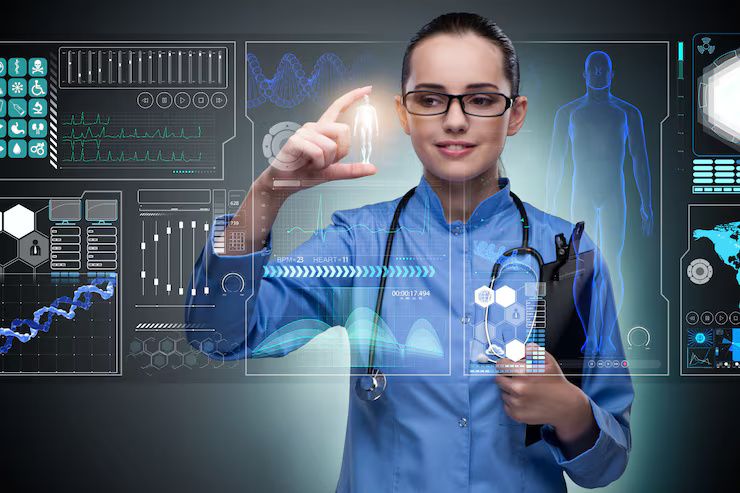Artificial Intelligence (AI) has rapidly become one of the most transformative technologies across industries, and healthcare is among the most significant areas of impact. The need for faster diagnosis, efficient treatment planning, and improved patient outcomes has driven the adoption of AI-powered medical tools. From analyzing complex medical images to predicting disease risks, AI is designed to complement the work of doctors and enhance healthcare delivery.
While AI does not replace medical professionals, it serves as a supporting system to reduce errors, speed up processes, and handle large-scale data that traditional methods cannot manage efficiently.

Importance – Why AI in medicine matters today
AI in healthcare matters because it addresses multiple challenges that modern healthcare systems face:
-
Rising healthcare costs: AI tools help optimize resource allocation and reduce unnecessary expenses.
-
Faster diagnoses: AI systems can scan X-rays, MRIs, and CT scans more quickly, supporting radiologists in identifying potential issues.
-
Patient-centered care: Chatbots and virtual assistants powered by AI provide round-the-clock assistance, improving patient engagement.
-
Data-driven decisions: With vast amounts of medical records and research, AI assists in identifying patterns, predicting outcomes, and personalizing treatments.
-
Global impact: AI can help bridge gaps in healthcare access by providing support in remote or underserved areas.
In simple terms, AI improves efficiency, accuracy, and accessibility—benefiting both patients and healthcare providers.
Recent Updates in AI and medicine
Over the past year, several advancements have highlighted the growing role of AI in medicine:
-
AI in drug discovery (2024): Major pharmaceutical companies reported significant cost and time reductions when using AI to identify potential compounds for clinical trials.
-
Wearable health monitoring: AI-powered wearable devices now provide real-time heart rate, oxygen level, and glucose monitoring, allowing earlier intervention for chronic conditions.
-
Generative AI in healthcare records: Hospitals are adopting AI models to summarize patient records, making information more accessible to physicians.
-
Regulatory approvals: In 2023 and 2024, several AI diagnostic tools received approval from health authorities in the US and EU, boosting adoption in hospitals and clinics.
These developments show how AI is moving from experimental use to practical, everyday applications in medicine.
Laws or policies affecting AI in healthcare
Government regulations and policies shape how AI can be used in medicine. These laws ensure patient safety, data privacy, and ethical standards.
-
Data protection: Countries like the US (HIPAA) and the EU (GDPR) enforce strict rules on handling patient information.
-
AI regulation acts: The European Union has proposed the AI Act, which classifies medical AI systems as high-risk, requiring rigorous testing and certification.
-
FDA approvals (United States): The Food and Drug Administration is increasingly approving AI-driven diagnostic software under its medical device regulation framework.
-
Telemedicine guidelines: Many countries are updating telemedicine laws to include AI-powered platforms, ensuring safe and legal use in virtual care.
These frameworks are critical because they balance innovation with safety, ensuring AI solutions are reliable and secure for public health.
Tools and resources for AI-powered healthcare
A number of platforms, applications, and services are already available that demonstrate the use of AI in medicine:
-
IBM Watson Health – Provides AI-driven insights for oncology and treatment planning.
-
Google DeepMind Health – Works on AI models for medical imaging and predictive analysis.
-
PathAI – Assists pathologists with faster and more accurate diagnoses.
-
Butterfly Network – Uses AI-enabled portable ultrasound devices.
-
Ada Health – A symptom-checker app powered by AI for patients.
-
Microsoft Cloud for Healthcare – Offers AI tools for managing patient data securely.
These resources help both healthcare providers and patients experience the benefits of AI in everyday care.
Table: AI Applications in Healthcare
| Area | AI Contribution | Benefit |
|---|---|---|
| Medical Imaging | AI scans and detects anomalies in X-rays | Faster and more accurate diagnosis |
| Drug Discovery | Identifies new compounds | Reduces research cost and time |
| Virtual Assistants | Provides patient support | Improves accessibility and engagement |
| Predictive Analytics | Uses patient history for forecasting | Early detection of health risks |
| Wearable Monitoring | Real-time health tracking | Prevents critical health emergencies |
FAQs
Q1. Can AI replace doctors in the future?
No, AI is not meant to replace doctors but to support them by handling data-heavy tasks, reducing workload, and improving accuracy in diagnosis and treatment planning.
Q2. Is AI safe to use in healthcare?
Yes, when regulated and approved by medical authorities, AI tools are considered safe. However, ethical use and strict adherence to data privacy laws are essential.
Q3. How does AI help patients directly?
Patients benefit from AI through faster diagnoses, personalized treatment recommendations, virtual health assistants, and continuous monitoring via wearable devices.
Q4. Are there risks in using AI for medicine?
Some risks include data privacy concerns, biases in AI algorithms, and over-reliance on technology. Proper regulations and human oversight help minimize these risks.
Q5. How widely is AI used in hospitals today?
AI adoption varies by region. In developed countries, it is increasingly integrated into imaging, patient record management, and telemedicine. In developing regions, adoption is slower but steadily growing.
Final thoughts
AI-powered solutions are not just futuristic concepts—they are already reshaping medicine today. While challenges such as regulation, ethics, and accessibility remain, the benefits of AI in healthcare are undeniable. From supporting doctors with diagnostics to empowering patients with better tools, AI represents one of the most important shifts in modern medicine.
The future of medicine will likely be a collaboration between human expertise and AI-driven innovation, ensuring healthcare becomes more accurate, accessible, and patient-focused.